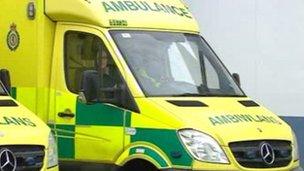Welsh Ambulance Service budget agreed after delay
- Published

The Welsh Ambulance Service had been without a budget since April
A budget for the Welsh Ambulance Service has been agreed two days after BBC Wales highlighted problems in agreeing the funding.
It was claimed that patients could be put at risk because the ambulance service did not know exactly how much money it has to spend this year.
It was understood some board members were "extremely concerned" about it.
Now the Welsh health boards and the ambulance service have reached a final agreement about this year's budget.
The Welsh Ambulance Service had been without a budget since April and the Welsh Liberal Democrats feared the uncertainty over money could have a knock-on effect on patients.
It was claimed the situation had contributed to cuts in the ambulance service - including a significant reduction in overtime payments to staff.
It came as statistics published on Wednesday showed the service failed to meet the target of responding to 65% of the most urgent calls within eight minutes for the fourth successive month.
A spokesperson for the Welsh NHS Confederation, which represents all trusts and local health boards in Wales, said following "ongoing and positive discussions" a funding agreement for 2012-13 had been agreed.
They said said it would meet "service pressures and support the [ambulance] trust in meeting its financial duties".
"The Welsh Ambulance Service will work hard to ensure resources are used effectively for patients in Wales and the trust and the health boards will continue to work together on the development of plans for the future," the spokesperson added.
The Welsh government said that local health boards were responsible for funding the service but it was pleased agreement has been reached "to ensure sufficient resources are available to respond to patients who need an emergency ambulance".
Figures, external showed the Welsh Ambulance Service failed to meet the target of responding to 65% of the most urgent calls within eight minutes for the fourth successive month.
In September 2012 there were more than 33,700 emergency calls, nearly 2% lower than August, of which more than 13,400 were Category A immediately life-threatening calls.
The service responded to 64.2% of Category A calls within eight minutes.
The response target for each council area is 60%, with 14 of the 22 areas meeting the target. Performance ranged from 53.9% in Blaenau Gwent to 74.9% in Wrexham.
- Published31 October 2012
- Published27 September 2012
- Published29 August 2012
- Published17 August 2012
- Published21 March 2012